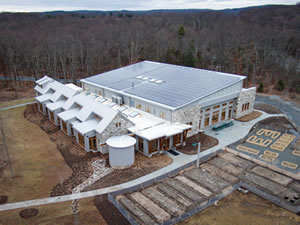Better HVAC for a Sustainable School

The Willow School was able to earn the Living Building
challenge certification with help from Mitsubishi Electric’s
VRF system.
Mark and Gretchen
Biedron co-founded the The
Willow School (Willow) in
Gladstone, N.J., to celebrate learning and
collaboration, and foster ethical relationships
between people and the natural
systems that support them. Sustainability
drives the curriculum and building design,
which led to the selection of a Variable
Refrigerant Flow (VRF) system from
Mitsubishi Electric Cooling & Heating (Mitsubishi
Electric) for its Health, Wellness
and Nutrition Center.
Biedron and his team took on the Living
Building Challenge (LBC) for the Health,
Wellness and Nutrition Center, which
required everything in the building to be
100-percent electric. The team chose VRF
over an all-electric geothermal system
because “VRF was well ahead on net-zero
efficiency.” The need for an electric kitchen
contributed to the selection of highefficiency
electric heat pumps and photovoltaic
panels to offset the energy used.
Including Lossnay Energy Recovery
Ventilators (ERVs) further improved efficiencies.
When conditions are agreeable
for natural ventilation, a controls system
prompts teachers and students to open
classroom windows. Otherwise, the ERVs
recover energy from exhaust air to simultaneously
cool or heat outside ventilation air.
“We had to remain net-zero or netpositive.
With solar panels and the Mitsubishi
[Electric] system, we were able to
achieve that,” says Biedron. “A conventional
facility built to code uses between 100-150
kBtu per square foot …but this building
uses only 21 kBtu per square foot. If you remove
the kitchen, it would only use 15 kBtu
per square foot.” Willow is one of the most
energy-efficient buildings in the country.
The project earned LBC certification
and is also recognized as a Green Ribbon
School by the United States DOE.
www.mitsubishipro.com
This article originally appeared in the issue of .